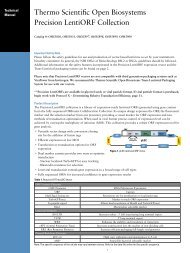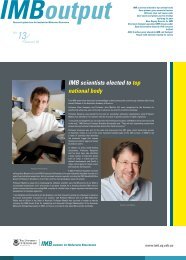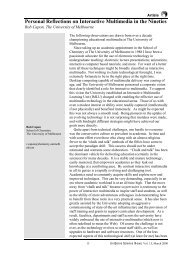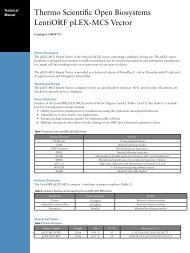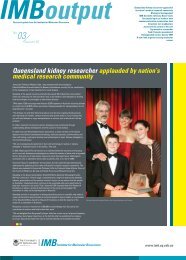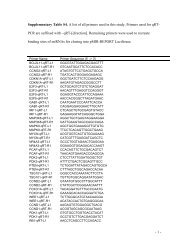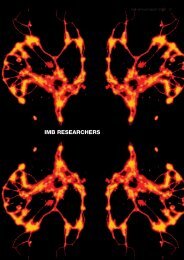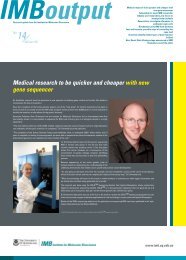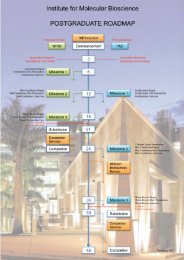2010 Annual Report - Institute for Molecular Bioscience - University ...
2010 Annual Report - Institute for Molecular Bioscience - University ...
2010 Annual Report - Institute for Molecular Bioscience - University ...
You also want an ePaper? Increase the reach of your titles
YUMPU automatically turns print PDFs into web optimized ePapers that Google loves.
imb annual report <strong>2010</strong><br />
30<br />
The <strong>Molecular</strong> Genetics and Development<br />
Division currently consists of ten groups<br />
containing around 100 researchers and<br />
students in total. A detailed description<br />
of each group’s research can be found<br />
in the following pages, but briefly,<br />
the research focus of each group is:<br />
the development and function of the<br />
lymphatic vessels (Dr Ben Hogan); the<br />
<strong>for</strong>mation of the developing embryo,<br />
particularly the gonads and blood<br />
and lymphatic vessels (Professor Peter<br />
Koopman); the development, repair and<br />
regeneration of the kidney (Professor<br />
Melissa Little); the role of nuclear hormone<br />
receptors in metabolic disease (Professor<br />
George Muscat); blood development<br />
(Associate Professor Andrew Perkins);<br />
the genetics of human pigmentation and<br />
skin cancer risk (Associate Professor<br />
Rick Sturm); the mechanisms by which<br />
the innate immune system responds to<br />
infection (Dr Matt Sweet); the genetics<br />
of tissue repair and heritable cancers,<br />
including basal cell carcinomas and<br />
medulloblastomas (Professor Brandon<br />
Wainwright); the molecular mechanisms<br />
behind limb and craniofacial development<br />
(Associate Professor Carol Wicking)<br />
and the elucidation of the regulatory<br />
mechanisms of embryonic development<br />
(Dr Dagmar Wilhelm).<br />
The division continues to sustain its<br />
research through success in competitive<br />
grant rounds. Our researchers received<br />
$1.5 million in project grants from<br />
the National Health and Medical<br />
Research Council and $1 million<br />
from the Australian Research Council<br />
(ARC). These included IMB’s largest<br />
grant across both schemes of $691k<br />
to Professor Melissa Little. This grant<br />
will fund Professor’s Little’s studies on<br />
kidney development, which aims to<br />
improve our understanding of chronic<br />
kidney disease. Professor Little is also<br />
one of the investigators on another large<br />
grant, $627k, led by Professor Karen<br />
Moritz of UQ’s School of Biomedical<br />
Sciences. This grant will examine the<br />
effect of lower oxygen levels on kidney<br />
development. Professor Peter Koopman<br />
and Dr Josephine Bowles received<br />
$660k from the ARC to continue the<br />
work described in their Developmental<br />
Cell paper (see above). The other three<br />
grants awarded to chief investigators<br />
from the division in these funding rounds<br />
went to: Dr Kelly Smith, a postdoctoral<br />
researcher from the Wicking group, Dr<br />
Ben Hogan, the institute’s youngest<br />
group leader, who was awarded two,<br />
and Dr Mathias Francois, a Koopman<br />
group postdoc who shared one of<br />
Dr Hogan’s grants. The latter two<br />
researchers were also successful in<br />
Fellowship funding rounds, with Dr<br />
Hogan being awarded an ARC Future<br />
Fellowship and Dr Francois receiving an<br />
NHMRC Career Development Award. Dr<br />
Matt Sweet was particularly successful<br />
in these rounds, being offered both an<br />
NHMRC Research Fellowship and an<br />
ARC Future Fellowship. As always, it is<br />
encouraging to see early- and midcareer<br />
researchers achieving success.<br />
The division’s researchers were not just<br />
recognised <strong>for</strong> their work through the<br />
awarding of competitive grants, but<br />
also through prizes. Dr Ben Hogan won<br />
a <strong>University</strong> of Queensland Research<br />
Excellence Award, worth $70,000, to<br />
identify genes critical to the development<br />
of the lymphatic vessels through the use<br />
of zebrafish models. Dr Kate Schroder<br />
from the Sweet group was awarded<br />
Postdoctoral Researcher of the Year<br />
at the Queensland Health and Medical<br />
Research Awards, the second year in a<br />
row this prize was won by a researcher<br />
from our division. Dr Schroder<br />
completed the first comparison of mice<br />
and human innate immune systems. In<br />
our student cohort, Dr Ming Chang, also<br />
from the Sweet group, was named on<br />
the Dean’s Awards List <strong>for</strong> Outstanding<br />
Research Higher Degree Theses. Only<br />
the top ten percent of research higher<br />
degree students are recognised in this<br />
way each year. Vicki Metzis from the<br />
Wicking group won several awards<br />
in <strong>2010</strong>, including the IMB and Inter-<br />
<strong>Institute</strong> rounds of the Three-Minute<br />
Thesis competition, and the People’s<br />
Choice Award in the Inter-<strong>Institute</strong> round.<br />
For a list of the remainder of Ms Metzis’s<br />
awards, and <strong>for</strong> other student awards,<br />
please see page 69.<br />
Our researchers continued to interact<br />
with the wider scientific community,<br />
presenting at conferences and other<br />
institutes, and hosting visitors to the IMB<br />
in return. These visitors included four<br />
national and international speakers in<br />
IMB’s Friday Seminar Series: Dr Stephen<br />
Cohen, Deputy Director of the <strong>Institute</strong> of<br />
<strong>Molecular</strong> and Cell Biology in Singapore;<br />
Professor Christopher Goodnow,<br />
Director of the Australian Phenomics<br />
Facility at the Australian National<br />
<strong>University</strong> in Canberra; Professor Simon<br />
Foote, Director of the Menzies Research<br />
<strong>Institute</strong> at the <strong>University</strong> of Tasmania in<br />
Hobart; and Professor Sharad Kumar<br />
from Adelaide’s <strong>Institute</strong> of Medical and<br />
Veterinary Science. Dr Dagmar Wilhelm<br />
organised the Division’s <strong>for</strong>tnightly<br />
seminar program, a <strong>for</strong>um <strong>for</strong> our staff<br />
and students to present their work<br />
to the rest of the division, and allow<br />
each of us a wider understanding of<br />
the research being undertaken across<br />
our ten laboratories. We continued<br />
to run the Brisbane Developmental<br />
Biology Seminar Series, a monthly<br />
seminar <strong>for</strong> all developmental biologists<br />
in Brisbane. In October, Dr Dagmar<br />
Wilhelm and Dr Kelly Smith organised<br />
the inaugural Cell and Developmental<br />
Biology Meeting. This symposium is one<br />
of the few that allows junior scientists,<br />
including postgraduate students, to<br />
share the stage with senior researchers,<br />
and was a huge success. Our division<br />
also sponsored the 6th Australian<br />
Developmental Biology Workshop in<br />
Melbourne, a training ground <strong>for</strong> the next<br />
generation of Australian developmental<br />
biologists.<br />
Last year I reported that the Division<br />
had been reviewed by Professor Robb<br />
Krumlauf and Professor Nancy Jenkins<br />
from the IMB’s Scientific Advisory<br />
Committee. As a result of feedback<br />
from that review, this year we instituted<br />
a divisional retreat aimed at improving<br />
our collective sense of belonging and<br />
gaining a better understanding the<br />
division’s areas of research interest<br />
and technical approaches. The retreat<br />
was very successful, with participants<br />
emerging with an increased awareness<br />
of best practice in the field as a whole,<br />
technology, equipment and services<br />
available at IMB and emerging research<br />
trends and technologies.




